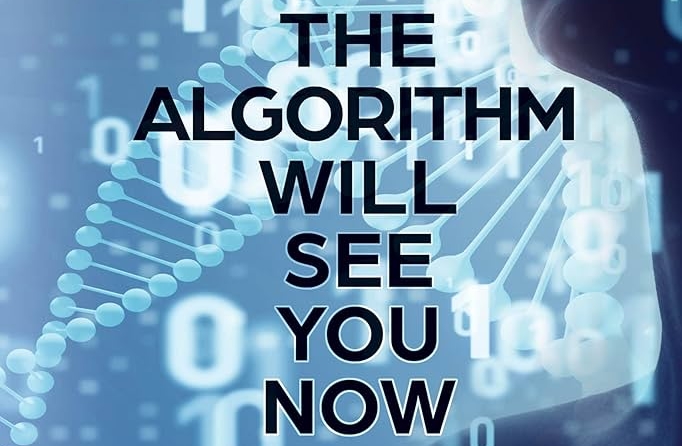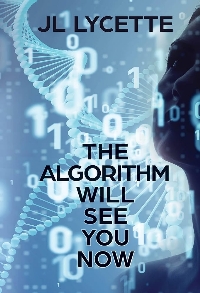Review: The Algorithm Will See You Now by JL Lycette

I received a free copy of this book from the author in return for an honest review.
‘Medical treatment determined by artificial intelligence could do more than make Hope Kestrel’s career. It could revolutionise healthcare.
‘What the Seattle surgeon doesn’t know is the AI has a hidden fatal flaw, and the people covering it up will stop at nothing to dominate the world’s healthcare – and its profits.
‘Soon, Hope is made the scapegoat for a patient’s death, and only Jacie Stone, a gifted intern with a knack for computer science, is willing to help search for the truth.
‘But her patient’s death is only the tip of the conspiracy’s iceberg. The Director, Marah Maddox, is plotting a use for the AI far outside the ethical bounds of her physician’s oath. A staggering plan capable of reducing human lives to their DNA code, redefining the concepts of sickness and health, and delivering the power of life and death decisions into the hands of those behind the AI.
‘Even if the algorithm accidentally discards some who are treatable in order to make that happen…’

In The Algorithm Will See You Now, by JL Lycette, it’s 2035, and at the Prognostic Intelligent Medical Algorithms (PRIMA) medical facility in Seattle, cancer patients are admitted for treatment only if a specially-trained AI predicts they’ll respond to it. The protocol is hailed as a way of negating the fallibility of human doctors and saving patients from gruelling, ultimately futile treatments – as well as money and time for the stretched healthcare system.
High (Chief) Resident Dr Hope Kestrel absolutely believes in PRIMA’s mission, having lost her mother to cancer at a young age despite increasingly aggressive medical interventions, and due to her close relationship with her long-time mentor Dr Cecilia Li, the brains behind the algorithm.
However, when one of Hope’s patients turns out to be a “non-responder” the algorithm shouldn’t have accepted for treatment in the first place, her faith in PRIMA – and heavy reliance on computers in medical practice more generally – is shaken.
Suspended from duty by the centre’s formidable Director Dr Marah Maddox, Hope, aided by computer whiz intern Jacie Stone, discovers the algorithm isn’t anywhere near as accurate as it’s purported to be, and that there are other shady activities going on at PRIMA besides. This has implications for thousands of people – including Hope’s pregnant nurse friend, Poppy, and Jacie’s cancer-stricken teenage sister, Izabella. Can Hope and her supporters achieve justice before it’s too late?
The Algorithm Will See You Now certainly packs a lot in!
At the story level, it’s a suspenseful, thrilling medical drama where nothing stays the same for long. There are many moving parts – multiple characters who each have a lot going on, secrets and betrayals that come to light at just the right (or wrong, if you’re a character affected by them!) moments, and setbacks that seem insurmountable – so it’s a real credit to the author that she keeps all these plates spinning to maximum effect.
It’s also a thought-provoking exploration of what an AI-led healthcare system might look like, and why it might not be such a good thing. Right from the start, I was unsettled by the spectacle of a hospital that adhered so strictly to pragmatic, utilitarian principles: sending sick people to the hospice rather than treating them, because the computer said “no”; accepting the risk that a small number of people would be incorrectly written off as untreatable; and extolling the money saved by treating only those the algorithm tagged as “responders”.
The disturbing consequences of medicine-by-algorithm go beyond the walls of PRIMA, though. For example, there’s a test that determines the likelihood of a miscarriage – so budding parents can pre-emptively terminate probably-doomed pregnancies early on – and it’s basically impossible to get your insurance company to pay out for cancer treatment at a more traditional hospital once PRIMA’s deemed you a non-responder. What’s more, PRIMA is gradually taking over other local healthcare providers, giving patients in Seattle less choice in whether they’re assessed by human or computer.
Accordingly, the key messages I took from this book concerned the qualities humans have that computers never will: infinite variety that defies categorisation, and the capacity to hope (yes, the initially-cynical main character’s name is remarked upon!) and make genuine choices – however irrational these might seem to others.
While a computer might competently guess whether a patient is likely to respond to treatment or not, a compassionate doctor – such as Izabella’s old-school GP, Dr Noah Meier – recognises that what didn’t work for one patient might yet work for another, however similar the two cases may appear, and isn’t arrogant enough to think we know everything there is to know about the human body or DNA – the unlikely and unprecedented can, and will, happen.
As PRIMA’s creators themselves are aware, the training set doesn’t (can’t) encompass every human possibility – in fact, it’s not even a representative sample of the entire population, with only five percent of the DNA data contributed by Black people.
Considering how people of, for example, varying genders and races experience different symptoms for the same/similar conditions, are treated differently by medical professionals when they present with them, and respond differently to the same treatments, it seems inevitable that the training data would just perpetuate these human biases and absences of knowledge and data, making the algorithm particularly likely to make correct predictions for straight white male patients, but not necessarily anyone else.
A page of this book that will really stay with me is the one where Noah explains to Hope the importance of giving patients a choice in whether to try a treatment that might not work, and the role of the family doctor in advocating for their patients’ wishes and wellbeing. He points out to her that the decision the individual makes depends on their particular life experiences up to that point – another way humans are too varied and “messy” to be put into neat boxes by a computer.
Something else Hope learns as the scales fall from her eyes is the importance of teamwork. While she’s never friendless, the trauma of her mother’s death has caused her to build walls and become hyper-independent. PRIMA has only encouraged these tendencies, with its competitive ranking of doctors’ performance and lack of collaboration – when Noah tells Hope how doctors made diagnoses before computers, he emphasises the importance of conferring with colleagues. Fighting the system with Jacie and co., however, leads her to realise she can’t, and doesn’t have to, do it all alone.
The Algorithm Will See You Now is a meticulously-plotted and thought-provoking medical thriller that reminds us what it means to be human.